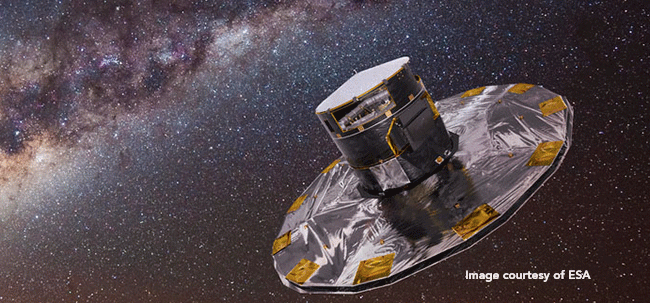Gaia offers the first stars catalog of our galaxy

The first catalog of more than a billion stars from ESA’s Gaia satellite was published recently, the largest all-sky survey of celestial objects to date.
Launched by the European Space Agency (ESA) in December 2013, the Gaia mission made a start on its scientific tasks in July 2014. This first publication is based on data culled during the first 14 months of skywatching, up to September 2015.
With an 11% participation, Spanish industry has played a key role in the Gaia project. GMV itself has contributed to the GAIA mission from the word go, beginning with the initial GAIA Data Access and Analysis Study (GDAAS), which studied the various mission-data access and analysis techniques. GMV personnel also helped to develop the Science Operations Centre (SOC) in ESAC and participated in verification and validation tasks while also coordinating software testing activities, mainly AGIS (Astrometric Global Iterative Solution), Main Database/First Look, GaiaTools and part of the Gaia Transfer System.
Together with the University of Barcelona (Universitat de Barcelona) and the Catalan Supercomputing Center (Centre de Supercomputació de Catalunya) GMV also formed part of the team in charge of carrying out Initial Data Treatment (IDT) as the first step in the data processing chain. This system is crucial for ensuring that this mission’s final data has the best possible quality. The GAIA satellite sent on the data to the receiving ground station for vetting of its quality, this then kick-starting the processing, in which GMV has intervened. The data is processed, archived and distributed to scientific institutes for subsequent analysis and use.
GMV was also responsible for GAIA’s Central Check Out System (CCS), which forms part of the Electrical Ground Support Equipment (EGSE). GMV was in charge of acquiring, installing, configuring and supporting the mission’s CCS, based on Astrium’s Open Center solution.
On its way to assembling the most detailed 3D map ever made of our Milky Way, Gaia has pinned down the precise position and brightness of 1.142 billion stars. As a foretaste of the richer catalog to come in the near future, this recent release also features the distances and the motions across the sky of more than two million stars.
Gaia’s catalog is expected to become the most precise and extensive star map ever. Experts also expect the information obtained to give us a much better grasp of the structure, dynamics and nature of galaxies. They even hope to be able to reconstruct the evolutionary history of our Milky Way on the basis of this data.